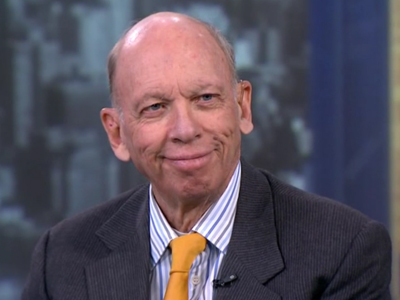Byron R. Wien, Vice-Chairman, and Joe Zidle, Chief Investment Strategist, Private Wealth Solutions, Blackstone
New York, January 3, 2022 – Byron R. Wien, Vice Chairman together with Joe Zidle, Chief Investment Strategist in the Private Wealth Solutions group at Blackstone, today issued their list of the Ten Surprises of 2022. This is the 37th year Byron has given his views on a number of economic, financial market and political surprises for the coming year. Byron defines a “surprise” as an event that the average investor would only assign a one out of three chance of taking place but which Byron believes is “probable,” having a better than 50% likelihood of happening. Byron started the tradition in 1986 when he was the Chief U.S. Investment Strategist at Morgan Stanley. Byron joined Blackstone in September 2009 as a senior advisor to both the firm and its clients in analyzing economic, political, market and social trends. In 2018, Joe Zidle joined Byron Wien in the development of the Ten Surprises.
Byron and Joe’s Ten Surprises of 2022 are as follows:
- The combination of strong earnings clashes with rising interest rates, resulting in the S&P 500 making no progress in 2022. Value outperforms growth. High volatility continues and there is a correction that approaches, but does not exceed, 20%.
- While the prices of some commodities decline, wages and rents continue to rise and the Consumer Price Index and other widely followed measures of inflation increase by 4.5% for the year. Declines in prices of transportation and energy encourage the die-hard proponents of the view that inflation is “transitory,” but persistent inflation becomes the dominant theme.
- The bond market begins to respond to rising inflation and tapering by the Federal Reserve, and the yield on the 10-year Treasury rises to 2.75%. The Fed completes its tapering and raises rates four times in 2022.
- In spite of the Omicron variant, group meetings and convention gatherings return to pre-pandemic levels by the end of the year. While Covid remains a problem throughout both the developed and the less-developed world, normal conditions are largely restored in the US. People spend three to four a days a week in offices and return to theaters, concerts, and sports arenas en masse.
- Chinese policymakers respond to recent turmoil in the country’s property markets by curbing speculative investment in housing. As a result, there is more capital from Chinese households that needs to be invested. A major asset management industry begins to flourish in China, creating opportunities for Western companies.
- The price of gold rallies by 20% to a new record high. Despite strong growth in the US, investors seek the perceived safety and inflation hedge of gold amidst rising prices and volatility. Gold reclaims its title as a haven for newly minted billionaires, even as cryptocurrencies continue to gain market share.
- While the major oil-producing countries conclude that high oil prices are speeding up the implementation of alternative energy programs and allowing US shale producers to become profitable again, these countries can’t increase production enough to meet demand. The price of West Texas crude confounds forward curves and analyst forecasts when it rises above $100 per barrel.
- Suddenly, the nuclear alternative for power generation enters the arena. Enough safety measures have been developed to reduce fears about its dangers, and the viability of nuclear power is widely acknowledged. A major nuclear site is approved for development in the Midwest of the United States. Fusion technology emerges as a possible future source of energy.
- ESG evolves beyond corporate policy statements. Government agencies develop and enforce new regulatory standards that require public companies in the US to publish information documenting progress on various metrics deemed critical in the new era. Federal Reserve governors spearhead implementation of stress tests to assess financial institutions’ vulnerability to climate change scenarios.
- In a setback to its green energy program, the United States finds it cannot buy enough lithium batteries to power the electric vehicles planned for production. China controls the lithium market, as well as the markets for the cobalt and nickel used in making the transmission rods, and it opts to reserve most of the supply of these commodities for domestic use.
“Also Rans”
Every year there are always a few Surprises that do not make the Ten, because we either do not think they are as relevant as those on the basic list or we are not comfortable with the idea that they are “probable.”
11. The FDA approves the first ex vivo gene-editing treatment. This stimulates further research into genomic medicine, and progress is accelerated on developing in vivo gene therapies. Ethical concerns around CRISPR technology inspire heated debate, but also focus investor attention on the pharmaceuticals and health care sectors.
12. The digital economy gets a major boost when Jamie Dimon reverses his position on cryptocurrencies and J.P. Morgan seeks to become a leader in the space. Crypto becomes a major factor in the financial markets.
13. The United States and China both seek to become the global leader in advanced semiconductor capabilities in order to reduce their dependence on offshore manufacturing of the technology. The US government commits major funds to private contractors for semiconductor research, while China focuses on state-owned enterprises to get the job done.
14. Puerto Rico becomes the new retirement destination of choice. People are attracted by the good weather and low tax rates, and they put aside fears of hurricanes.
*****
About Blackstone
Blackstone is the world’s largest alternative asset manager. We seek to create positive economic impact and long-term value for our investors, the companies we invest in, and the communities in which we work. We do this by using extraordinary people and flexible capital to help companies solve problems. Our $731 billion in assets under management include investment vehicles focused on private equity, real estate, public debt and equity, infrastructure, life sciences, growth equity, opportunistic, non-investment grade credit, real assets and secondary funds, all on a global basis. Further information is available at www.blackstone.com. Follow Blackstone on Twitter @Blackstone.
Copyright © Blackstone














